I tryed to send a POST request to a remote secure server ( https call). First i used the OkHTTP lib to make the call, as this lib worked to make http calls in a previous app, but with https it does not work anymore, see my previous post : Cannot make HTTPS calls with OKHTTP lib
I decided to try the HttpURLConnection to make the call as explained here : https://developer.android.com/reference/java/net/HttpURLConnection.html The code I am using only works on certain devices.
It does work with a Wiko on android 6.0 equiped with SIM card and wifi and does not work on a Samsung on Android 4.2.2 only linked to internet via Wifi.
Here is a logcat of the problem I encounter :
02-23 12:29:59.893 11026-11951 W/System.err: javax.net.ssl.SSLHandshakeException: com.android.org.bouncycastle.jce.exception.ExtCertPathValidatorException: Could not validate certificate signature.
02-23 12:29:59.923 11026-11951 W/System.err: at org.apache.harmony.xnet.provider.jsse.OpenSSLSocketImpl.startHandshake(OpenSSLSocketImpl.java:382)
02-23 12:29:59.923 11026-11951 W/System.err: at libcore.net.http.HttpConnection.setupSecureSocket(HttpConnection.java:231)
02-23 12:29:59.923 11026-11951 W/System.err: at libcore.net.http.HttpsURLConnectionImpl$HttpsEngine.makeSslConnection(HttpsURLConnectionImpl.java:478)
02-23 12:29:59.923 11026-11951 W/System.err: at libcore.net.http.HttpsURLConnectionImpl$HttpsEngine.connect(HttpsURLConnectionImpl.java:433)
02-23 12:29:59.923 11026-11951 W/System.err: at libcore.net.http.HttpEngine.sendSocketRequest(HttpEngine.java:290)
02-23 12:29:59.923 11026-11951 W/System.err: at libcore.net.http.HttpEngine.sendRequest(HttpEngine.java:240)
02-23 12:29:59.923 11026-11951 W/System.err: at libcore.net.http.HttpURLConnectionImpl.connect(HttpURLConnectionImpl.java:81)
02-23 12:29:59.923 11026-11951 W/System.err: at libcore.net.http.HttpURLConnectionImpl.getOutputStream(HttpURLConnectionImpl.java:197)
02-23 12:29:59.923 11026-11951 W/System.err: at libcore.net.http.HttpsURLConnectionImpl.getOutputStream(HttpsURLConnectionImpl.java:281)
02-23 12:29:59.923 11026-11951 W/System.err: at com.gulplug.gulplugtoolbox.DiagnosisOnline$NetworkAsyncTask.doInBackground(DiagnosisOnline.java:109)
02-23 12:29:59.923 11026-11951 W/System.err: at com.gulplug.gulplugtoolbox.DiagnosisOnline$NetworkAsyncTask.doInBackground(DiagnosisOnline.java:82)
02-23 12:29:59.923 11026-11951 W/System.err: at android.os.AsyncTask$2.call(AsyncTask.java:287)
02-23 12:29:59.923 11026-11951 W/System.err: at java.util.concurrent.FutureTask.run(FutureTask.java:234)
02-23 12:29:59.923 11026-11951 W/System.err: at android.os.AsyncTask$SerialExecutor$1.run(AsyncTask.java:230)
02-23 12:29:59.923 11026-11951 W/System.err: at java.util.concurrent.ThreadPoolExecutor.runWorker(ThreadPoolExecutor.java:1080)
02-23 12:29:59.923 11026-11951 W/System.err: at java.util.concurrent.ThreadPoolExecutor$Worker.run(ThreadPoolExecutor.java:573)
02-23 12:29:59.933 11026-11951 W/System.err: at java.lang.Thread.run(Thread.java:856)
02-23 12:29:59.933 11026-11951 W/System.err: Caused by: java.security.cert.CertificateException: com.android.org.bouncycastle.jce.exception.ExtCertPathValidatorException: Could not validate certificate signature.
02-23 12:29:59.933 11026-11951 W/System.err: at org.apache.harmony.xnet.provider.jsse.TrustManagerImpl.checkTrusted(TrustManagerImpl.java:296)
02-23 12:29:59.933 11026-11951 W/System.err: at org.apache.harmony.xnet.provider.jsse.TrustManagerImpl.checkServerTrusted(TrustManagerImpl.java:197)
02-23 12:29:59.933 11026-11951 W/System.err: at org.apache.harmony.xnet.provider.jsse.OpenSSLSocketImpl.verifyCertificateChain(OpenSSLSocketImpl.java:598)
02-23 12:29:59.933 11026-11951 W/System.err: at org.apache.harmony.xnet.provider.jsse.NativeCrypto.SSL_do_handshake(Native Method)
02-23 12:29:59.933 11026-11951 W/System.err: at org.apache.harmony.xnet.provider.jsse.OpenSSLSocketImpl.startHandshake(OpenSSLSocketImpl.java:379)
02-23 12:29:59.933 11026-11951 W/System.err: ... 16 more
02-23 12:29:59.933 11026-11951 W/System.err: Caused by: com.android.org.bouncycastle.jce.exception.ExtCertPathValidatorException: Could not validate certificate signature.
02-23 12:29:59.943 11026-11951 W/System.err: at com.android.org.bouncycastle.jce.provider.RFC3280CertPathUtilities.processCertA(RFC3280CertPathUtilities.java:1475)
02-23 12:29:59.943 11026-11951 W/System.err: at com.android.org.bouncycastle.jce.provider.PKIXCertPathValidatorSpi.engineValidate(PKIXCertPathValidatorSpi.java:305)
02-23 12:29:59.943 11026-11951 W/System.err: at com.sec.android.security.pkix.SecCertPathValidatorSpi.engineValidate(SecCertPathValidatorSpi.java:99)
02-23 12:29:59.953 11026-11951 W/System.err: at java.security.cert.CertPathValidator.validate(CertPathValidator.java:190)
02-23 12:29:59.953 11026-11951 W/System.err: at org.apache.harmony.xnet.provider.jsse.TrustManagerImpl.checkTrusted(TrustManagerImpl.java:283)
02-23 12:29:59.953 11026-11951 W/System.err: ... 20 more
02-23 12:29:59.953 11026-11951 W/System.err: Caused by: java.security.SignatureException: Signature was not verified
02-23 12:29:59.953 11026-11951 W/System.err: at org.apache.harmony.security.provider.cert.X509CertImpl.verify(X509CertImpl.java:384)
02-23 12:29:59.953 11026-11951 W/System.err: at com.android.org.bouncycastle.jce.provider.CertPathValidatorUtilities.verifyX509Certificate(CertPathValidatorUtilities.java:1428)
02-23 12:29:59.953 11026-11951 W/System.err: at com.android.org.bouncycastle.jce.provider.RFC3280CertPathUtilities.processCertA(RFC3280CertPathUtilities.java:1470)
02-23 12:29:59.953 11026-11951 W/System.err: ... 24 more
and the code attached to this log :
class NetworkAsyncTask extends AsyncTask<Void, Void, Void> {
@Override
protected Void doInBackground(Void... voids) {
Authentification authentification = new Authentification();
authentification.setApplicationToken(applicationtoken);
Gson gson = new Gson();
//String json = gson.toJson(authentification);
String json = "";
Log.d(TAG, json);
JSONObject auth = new JSONObject();
try {
auth.put("application_token",mytoken);
} catch (JSONException e) {
e.printStackTrace();
}
String url = myurl;
try {
URL object = new URL(url);
HttpsURLConnection con = (HttpsURLConnection) object.openConnection();
con.setDoOutput(true);
con.setDoInput(true);
con.setRequestProperty("Content-Type", "application/json");
con.setRequestProperty("Accept", "application/json");
con.setRequestProperty("Content-Lenght", String.valueOf(json.getBytes("UTF-8").length));
con.setRequestMethod("POST");
con.setSSLSocketFactory((SSLSocketFactory) SSLSocketFactory.getDefault());
OutputStreamWriter wr = null;
wr = new OutputStreamWriter(con.getOutputStream());
wr.write(auth.toString());
wr.flush();
StringBuilder sb = new StringBuilder();
int HttpResult = 0;
HttpResult = con.getResponseCode();
if (HttpResult == HttpURLConnection.HTTP_OK) {
BufferedReader br = new BufferedReader(
new InputStreamReader(con.getInputStream(), "utf-8"));
String line = null;
while ((line = br.readLine()) != null) {
sb.append(line + "\n");
}
br.close();
Log.d(TAG, "First log");
Log.d(TAG, "" + sb.toString());
} else {
Log.d(TAG, "response code : " + HttpResult);
Log.d(TAG, "Http not ok");
Log.d(TAG, con.getResponseMessage());
}
} catch (MalformedURLException e) {
e.printStackTrace();
} catch (IOException e) {
e.printStackTrace();
}
return null;
}
}
I don't understand why my first device can validate the signature and the other not. I tryed to sync the date and time as explained here: Could not validate certificate signature?
A possible explanation of my problem here but i don't get it https://groups.google.com/forum/#!topic/android-security-discuss/C_cm3k9SdaM
Does someone encountered the same problem and fixed it ?
UPDT : Both of the methods presented by Alex and Anton are not working with my device. Using Google play service says that provider is up to date. And I still get no signature validation when enabling TLS 1.1 and 1.2 with the method described here : https://blog.dev-area.net/2015/08/13/android-4-1-enable-tls-1-1-and-tls-1-2/
UPDT 2:
Following this link, the server should use TLS 1.1 : https://www.ssllabs.com
